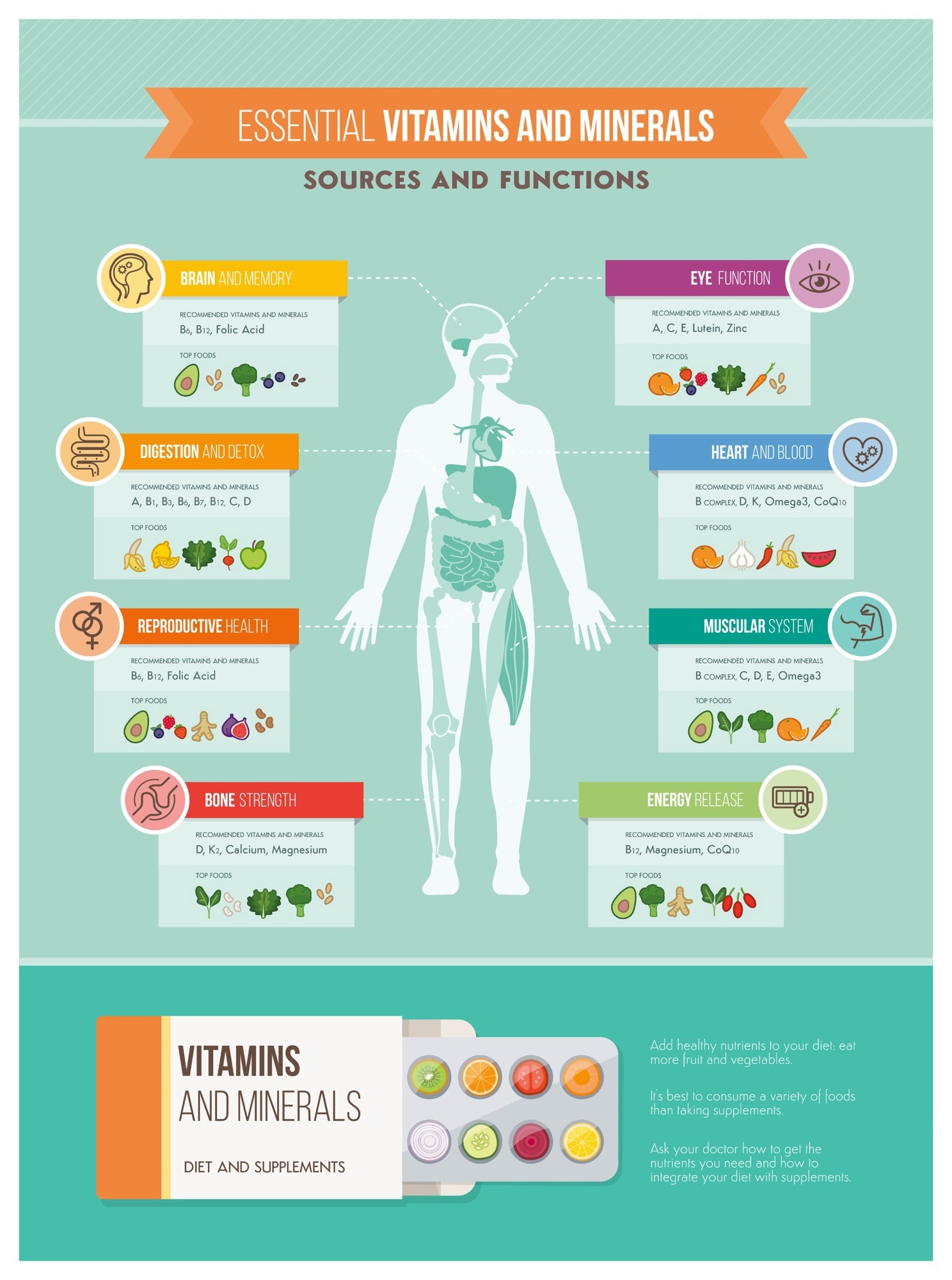Why does vitamin absorption matter?
Factors affecting vitamin absorption
Vitamin A malabsorption
Vitamin D malabsorption
Vitamin E malabsorption
Vitamin K malabsorption
Vitamin C malabsorption
Vitamin B12 malabsorption
References
Further reading
Malabsorption refers to the reduced absorption of nutrients from the intestine into the bloodstream. It can affect the body’s ability to absorb all nutrients or some specific types of nutrients.

Image Credit: Avocado_studio/Shutterstock.com
Why does vitamin absorption matter?
Vitamins are a group of micronutrients required for boosting immunity, supporting growth and development, and maintaining normal body functions. Fat-soluble vitamins, including vitamins A, D, E, and K, are stored in the liver, fat tissues, and muscles after intestinal absorption 1.
In contrast, water-soluble vitamins, including vitamin C and B vitamins (thiamin, riboflavin, niacin, pantothenic acid, pyridoxine, cobalamin, biotin, and folic acid), are not stored in the body and thus should be consumed regularly to avoid their deficiencies. One exception is vitamin B12, which can be stored in the liver for many years 1.
Vitamin deficiency can occur due to low intake of vitamin-containing foods or intestinal malabsorption of vitamins from foods. Chronic malabsorption of these micronutrients can cause a range of health complications, including skin disease, dry eyes and vision impairment, bone disorders, hair loss, anemia, immune deficiency, and neurological problems 2.
Factors affecting vitamin absorption
Vitamin malabsorption can result from damage to the small intestinal mucus lining, which can occur due to infectious diseases, inflammatory bowel diseases, short bowel syndrome, autoimmune diseases, medicine overdose, small intestinal bacterial overgrowth, and radiation therapy or chemotherapy 3.
Pancreas, gallbladder, and liver diseases can impair the small intestine’s ability to digest food properly. This could lead to vitamin malabsorption. Impaired intestinal absorption of fats due to lymphatic system diseases can also lead to malabsorption of fat-soluble vitamins 3.
Apart from these common contributors to malabsorption, the human body can develop particular difficulties in absorbing a particular type of vitamin.

Image Credit: elenabsl/Shutterstock.com
Vitamin A malabsorption
Fat-soluble vitamin A plays a major role in regulating the visual cycle, immune function, and cell differentiation. Impaired fat absorption after intestinal resection and intestinal bypass (bariatric surgery) can lead to vitamin A malabsorption 4.
Common manifestations of vitamin A deficiency include reversible night blindness, dry eyes, poor bone growth, and impaired immune functions 2.
Vitamin D malabsorption
Fat-soluble vitamin D is required for calcium and phosphorus absorption and bone health maintenance. Vitamin D deficiency can result from inadequate exposure to sunlight, skin hyperpigmentation, malnutrition, certain medications, certain cancer types, and liver or kidney failure that impair adequate processing of vitamin D 5.
Certain malabsorption disorders, such as inflammatory bowel disease, Celiac disease, and cystic fibrosis, can affect the intestinal absorption of vitamin D. Certain operative procedures, such as bariatric weight loss surgery and small intestinal resection, can also reduce vitamin D absorption 5.
Vitamin D deficiency can lead to muscle weakness, spasms, pain, and aggravation or recurrence of gastrointestinal tract diseases, especially inflammatory bowel disease 6.
Vitamin E malabsorption
Lipoprotein deficiency and fat malabsorption syndrome are the most common causes of reduced vitamin E absorption through the intestine. Health conditions that affect intestinal fat absorption, such as abetalipoproteinemia, cystic fibrosis, and congenital biliary atresia, can increase the risk of vitamin E deficiency 7.
Vitamin E deficiency can lead to anemia, muscular dystrophy, lethargy, weakness, jaundice, and splenomegaly. In diabetic patients, deficiency of this fat-soluble micronutrient can trigger early development of neurological symptoms 7
Vitamin K malabsorption
Fat-soluble vitamin K malabsorption can result from reduced fat absorption, which can be associated with severe gastrointestinal disease, liver disease, pancreatic insufficiency, biliary obstruction, or intestinal mucosa atrophy. Long-term use of broad-spectrum antibiotics can inhibit vitamin K synthesis 8.
Vitamin K deficiency can also occur after warfarin therapy or anticoagulant rodenticide toxicity, as these compounds inhibit the enzyme vitamin K epoxide reductase, which is required for vitamin K recycling 8.
Vitamin K deficiency is associated with severe bleeding disorders and poor bone mineral density 2.
Vitamin C malabsorption
Intestinal absorption of water-soluble vitamin C can be impaired due to certain medical conditions, including Crohn's disease, celiac disease, anorexia nervosa, alcohol use disorder, psychiatric illness, and kidney failure. Surgical resection or removal of the small or large intestine can also reduce vitamin C absorption 9.
The clinical manifestation of vitamin C deficiency is scurvy, which rarely occurs in developed countries. The most common symptoms include fatigue, malaise, gum inflammation and bleeding, poor wound healing, skin hemorrhage, dry, brittle hair, and iron deficiency anemia 10.
Vitamin B12 malabsorption
Vitamin B12 is a water-soluble micronutrient whose absorption from food requires normal functioning of the stomach, pancreas, and small intestine. It is released from food by stomach acids and enzymes and transported by the complex interactions between three proteins: intrinsic factor, haptocorrin, and transcobalamin 11.
How will I know if I'm not absorbing nutrients well?
The main causes of vitamin B12 malabsorption include intrinsic factor deficiency, pernicious anemia, pancreatic insufficiency, bariatric surgery, and gastrectomy 12.
Pernicious anemia is characterized by autoantibody-mediated destruction of stomach cells, leading to reduced secretion of acids and enzymes required for releasing food-bound vitamin B12. Autoantibodies generated against intrinsic factors prevent vitamin B12 from binding to them. These factors collectively lead to a substantial reduction in vitamin B12 absorption 11.
Since the pancreas provides critical enzymes and calcium required for vitamin B12 absorption, pancreatic insufficiency may contribute to vitamin B12 malabsorption 11.
A strictly vegetarian or vegan diet without supplements can also lead to vitamin B12 deficiency, as animal-based foods are the primary source of this vitamin.
Vitamin B12 deficiency is associated with megaloblastic anemia, neurological symptoms (peripheral neuropathy, difficulty walking, cognitive impairment, dementia, depression, and anxiety), and gastrointestinal symptoms (loss of appetite, constipation, and tongue soreness) 11.
References
1. Vitamins: MedlinePlus Medical Encyclopedia. Accessed November 27, 2024. https://medlineplus.gov/ency/article/002399.htm
2. Philadelphia TCH of. Disorders of Vitamin Absorption | Children’s Hospital of Philadelphia. Accessed November 27, 2024. https://www.chop.edu/conditions-diseases/disorders-vitamin-absorption
3. Malabsorption (Syndrome). Cleveland Clinic. Accessed November 27, 2024. https://my.clevelandclinic.org/health/diseases/22722-malabsorption
4. Phanachet P, Shantavasinkul PC, Chantrathammachart P, et al. Unusual manifestation of vitamin A deficiency presenting with generalized xerosis without night blindness. Clin Case Rep. 2018;6(5):878-882. doi:10.1002/ccr3.1475
5. Vitamin D Deficiency. Yale Medicine. Accessed November 28, 2024. https://www.yalemedicine.org/conditions/vitamin-d-deficiency
6. Giustina A, di Filippo L, Allora A, et al. Vitamin D and malabsorptive gastrointestinal conditions: A bidirectional relationship? Rev Endocr Metab Disord. 2023;24(2):121-138. doi:10.1007/s11154-023-09792-7
7. Vitamin E Deficiency - an overview | ScienceDirect Topics. Accessed November 28, 2024. https://www.sciencedirect.com/topics/biochemistry-genetics-and-molecular-biology/vitamin-e-deficiency
8. Vitamin K Deficiency - an overview | ScienceDirect Topics. Accessed November 28, 2024. https://www.sciencedirect.com/topics/pharmacology-toxicology-and-pharmaceutical-science/vitamin-k-deficiency
9. Dunleavy KA, Ungaro RC, Manning L, Gold S, Novak J, Colombel JF. Vitamin C Deficiency in Inflammatory Bowel Disease: The Forgotten Micronutrient. Crohns Colitis 360. 2021;3(1):otab009. doi:10.1093/crocol/otab009
10. Office of Dietary Supplements - Vitamin C. Accessed November 28, 2024. https://ods.od.nih.gov/factsheets/VitaminC-HealthProfessional/
11. Vitamin B12. Linus Pauling Institute. April 22, 2014. Accessed November 28, 2024. https://lpi.oregonstate.edu/mic/vitamins/vitamin-B12
12. Guéant JL, Guéant-Rodriguez RM, Alpers DH. Vitamin B12 absorption and malabsorption. Vitam Horm. 2022;119:241-274. doi:10.1016/bs.vh.2022.01.016
13. Malabsorption - IFFGD. Accessed November 28, 2024. https://iffgd.org/gi-disorders/malabsorption/
Further Reading
Last Updated: Dec 6, 2024